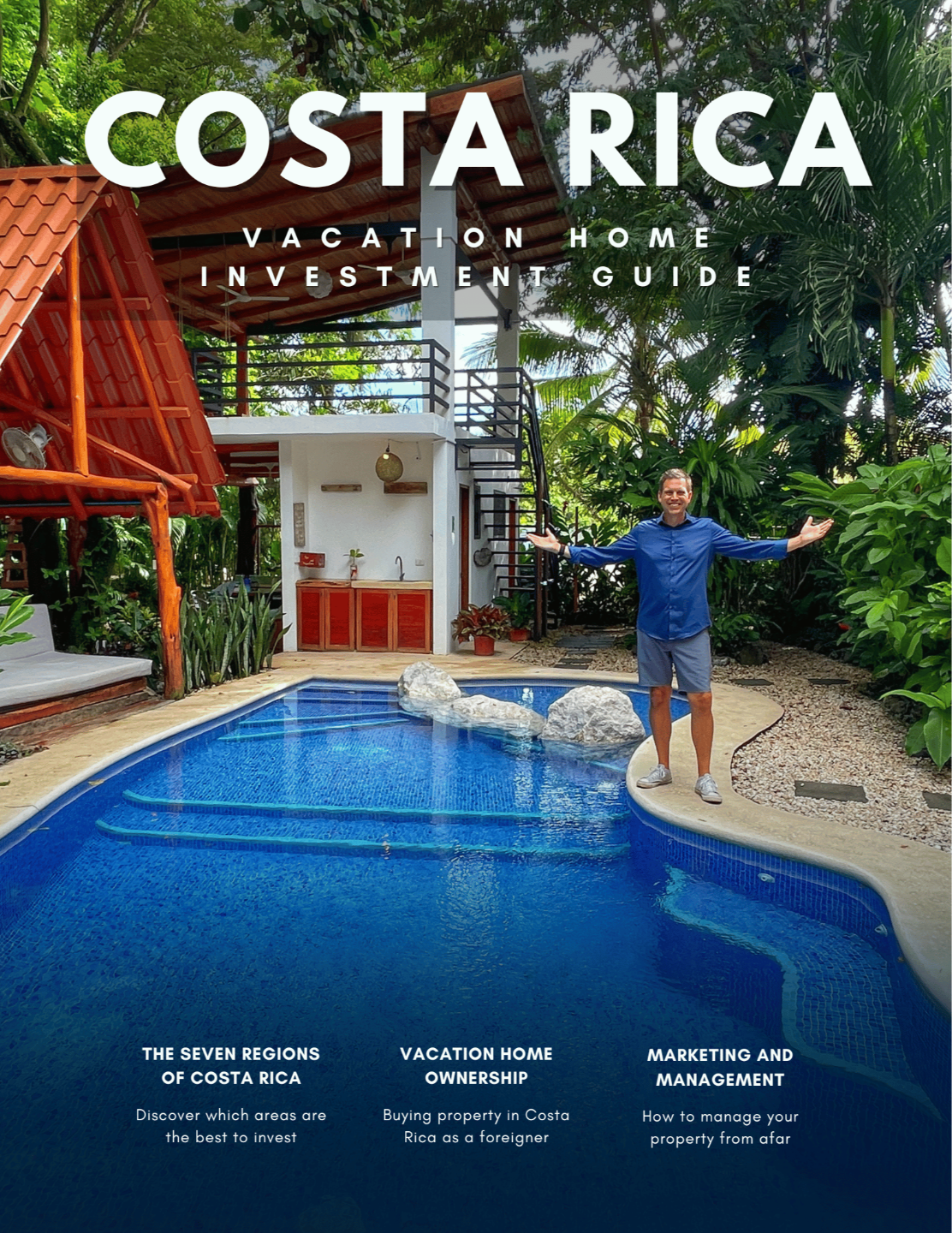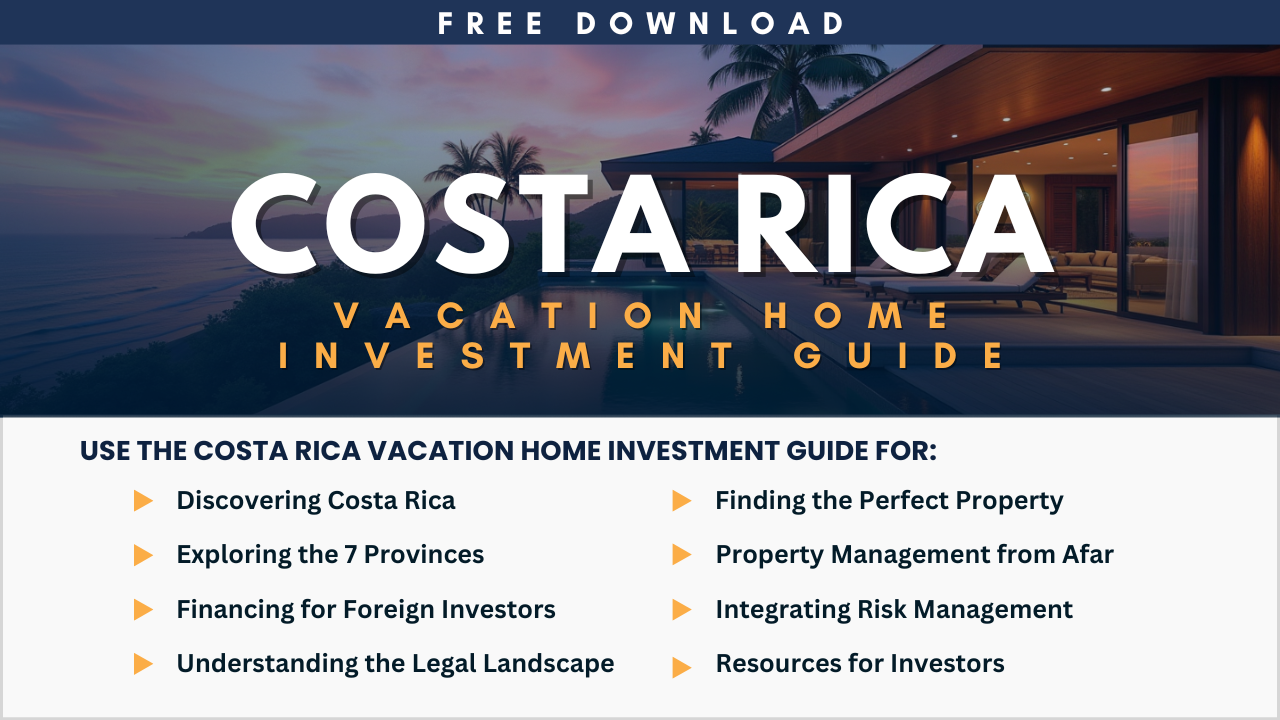
Why Emotion-Led Property Purchases Can Cost You
When it comes to investing in real estate, many people are drawn to properties that speak to their emotions—the breathtaking view, the tranquil vibe, or the dream of owning a piece of paradise. Costa Rica, with its lush landscapes and idyllic beaches, is no exception. It’s easy to get swept up in the fantasy of having your own slice of paradise. But falling in love with the view or the charm of a property can lead to some costly mistakes if you're not careful.
While emotional appeal is an important factor in property decisions, it’s crucial to keep a level head and focus on the numbers. In this article, we’ll explore how letting emotions drive your investment choices can hurt your bottom line and why it’s essential to base your decision on data-driven insights to maximize your return on investment (ROI).
Why the View Isn’t Everything
Picture this: you’re standing on the balcony of a Costa Rican property, taking in the endless ocean views and imagining yourself sipping a cocktail as the sun sets. It feels like paradise, and you’re already thinking about all the memories you’ll make there. But before you sign on the dotted line, remember that emotion-driven purchases often overlook the key factors that contribute to the financial success of an investment.
Investors often focus on aesthetics—the location, the design, or the dream lifestyle they can sell to potential vacationers. While these factors do matter, they don’t always translate into solid returns. A beautiful view or a perfect location may seem like the ideal setting for your vacation rental, but unless the property has the right fundamentals to support consistent bookings and long-term profitability, those emotions can lead you down a costly path.
The Dangers of Skipping the Numbers
It's easy to get excited about a property that feels like a dream come true, but that’s where the numbers come in. Without crunching the numbers, you might be buying into a property that isn’t as profitable as it seems. Let’s break down why the numbers matter:
- Location Isn’t Everything: Many buyers assume that a prime location guarantees success, but that’s not always the case. While popular tourist destinations like Costa Rica’s beachfront towns are often in demand, competition is fierce. If the numbers don’t align with rental demand, occupancy rates, and expenses, you could end up with a property that’s not turning a profit. In Costa Rica:
- Rental income for a beachfront property can range from $1,500 to $5,000 per month.
- During the off-season, occupancy rates can drop by up to 30% or more, affecting your revenue significantly.
- High Maintenance Costs: Some properties look stunning in photos, but when you consider ongoing maintenance, repairs, and management fees, the costs can quickly add up. For example:
- Annual maintenance costs for a beach property can be upwards of 10% of the property’s value, depending on its proximity to the ocean and the property’s age
- Additional costs include utilities, cleaning services, and emergency repairs, which can eat into your profits.
- Market Trends Over Personal Preference: Sometimes, an investor’s personal taste or desires for a property can overshadow market trends. If you’re choosing a property that appeals to your own sense of style rather than what potential renters are looking for, it can result in slower bookings and a lower return on investment. For example:
- If your preference is for modern, minimalist design, vacationers may prefer more rustic, local touches, reflecting Costa Rica’s rich culture.
- Properties with local elements (e.g., wood finishes, eco-friendly features) have seen an increase in demand, with eco-tourism becoming more prominent in the region.
The Role of Property Management in Costa Rica Investments
Many investors assume that managing their property from abroad will be easy, especially with platforms like Airbnb offering a streamlined rental process. However, property management in Costa Rica requires a deeper understanding of local dynamics. Here’s why local management is essential:
- Efficient Operations: A property management team helps with day-to-day operations like booking, guest services, and compliance with local regulations.
- Maintenance: They can handle regular upkeep, from small repairs to major renovations. In coastal areas, properties are more vulnerable to the harsh weather, which requires regular maintenance.
- Market Insights: A local property manager understands the fluctuations in demand and can adjust your pricing strategies based on seasonal trends.
- Legal Compliance: They ensure your property complies with Costa Rica’s rental laws, particularly around taxes, permits, and foreign ownership in the Maritime Zone.
Investing in a reliable property management team can significantly improve rental income and reduce headaches. It's a key factor in ensuring a positive ROI, especially when renting out properties in remote or highly competitive markets.
Eco-Tourism and Sustainable Property Features
Eco-tourism is on the rise, and Costa Rica is at the forefront of this movement. More and more tourists are looking for properties that prioritize sustainability. Here’s why sustainable features can boost your investment:
- Eco-Friendly Appeal: Properties with green features such as solar panels, rainwater collection systems, and energy-efficient appliances are becoming increasingly attractive to eco-conscious renters.
- Premium Rentals: Tourists are willing to pay more for properties that align with their environmental values. For example, an eco-friendly property can often fetch 20-30% higher rates than conventional rentals.
- Costa Rica’s Reputation for Sustainability: Costa Rica is renowned for its natural beauty and dedication to environmental protection. Highlighting eco-friendly features in your property can attract high-value, long-term guests.
- Long-Term Savings: Investing in sustainable features can lower long-term operating costs by reducing energy and water usage. Over time, these features can pay for themselves and help you maintain a strong ROI.
Eco-tourism is not only an emerging trend but also a strategic way to ensure consistent demand and higher rental rates. Properties that reflect the eco-conscious ethos of Costa Rica attract both premium clients and provide a sustainable investment strategy.
Cash Flow Concerns
While it may feel great to own a piece of paradise, the cash flow is what truly matters. Is the property capable of covering its operating costs while generating the income you expect? Can it consistently produce enough revenue to justify the initial purchase price? If you don’t take the time to assess these factors, the excitement of owning a beautiful property could quickly turn into a financial strain. A property that’s priced at $500,000 might only generate $3,000 per month in rental income. Over the course of a year, that’s $36,000 in revenue—far from enough to cover the ongoing expenses, especially if you plan to reinvest in the property or make upgrades.
How to Keep Your Emotions in Check and Focus on ROI
To ensure that you’re making a smart investment, you need to focus on the numbers while still appreciating the appeal of the property. Here are a few steps to keep your emotions in check and maximize your ROI:
- Research Market Trends: Before buying, take the time to research local market trends. Look at rental demand, occupancy rates, and average rental income in the area. Understanding the competitive landscape and knowing what makes a property attractive to renters will help you make more informed choices. For example:
- Markets like Nosara, Tamarindo, and Uvita have seen steady growth in rental income, with vacation rentals earning $2,000 to $5,000 per month.
- Understanding the seasonal fluctuations, such as high season from December to April and low season from May to November, will help you plan for periods of reduced demand.
- Assess Long-Term Potential: Think beyond the initial thrill of owning a vacation property. Consider the long-term viability of the property as an income-generating asset. Is it in an area that will maintain or grow in popularity? Is there potential for property value appreciation? Costa Rica has seen consistent growth in real estate values, particularly in areas popular with international buyers. In the past five years, property values in some coastal areas have appreciated by as much as 15-20%. But keep in mind that real estate markets can also be volatile, so don’t bank on appreciation alone to boost your ROI.
- Calculate the Total Costs: Beyond the purchase price, consider all costs associated with owning the property, including taxes, maintenance, insurance, and management fees. In Costa Rica, you’ll need to account the following:
- Property taxes are 0.25% of the registered value.
- Luxury taxes apply to properties valued over $260,000.
- You’ll also need to account for capital gains taxes when selling the property.
- Consult with Local Experts: Work with a local real estate agent, tax advisor, and property manager to get an accurate picture of the property’s financial potential. Local experts can help you assess whether the property aligns with your financial goals and advise you on factors you may not have considered. They can also help you understand Costa Rica’s legal framework, especially if the property is in the Maritime Zone, where foreign ownership may require setting up a corporation.
- Stick to Your Investment Criteria: Create a clear investment strategy based on your financial goals. Define your target rental income, ROI expectations, and risk tolerance. Don’t let the emotional appeal of a property derail your plan. Stick to your criteria and assess each property objectively. For example, if your goal is a steady cash flow rather than rapid appreciation, focus on properties with high rental demand, even if they aren’t beachfront.
Conclusion
Costa Rica’s stunning properties are certainly tempting, and it’s easy to get emotionally attached to the idea of owning a vacation home in a tropical paradise. However, letting emotions drive your investment decisions can lead to costly mistakes that harm your financial future. By focusing on the numbers, conducting thorough research, and working with local experts, you can ensure that your investment generates the return you’re expecting.
Keep your excitement in check, assess the market with a critical eye, and make decisions based on data, not just dreams. The key to a successful investment in Costa Rica is striking the right balance between passion and practicality. When you focus on the fundamentals and approach the market with a clear, strategic plan, you’ll be in a much stronger position to achieve your financial goals.
Remember, investing in property is a marathon, not a sprint. Buy smart, and you’ll be better equipped to enjoy the rewards of your investment, all while minimizing unnecessary stress and challenges.
For more tips on making smart, data-driven property decisions, visit the Vacation Property Expert Network at 👉 www.vacationpropertyexpertnetwork.com.







